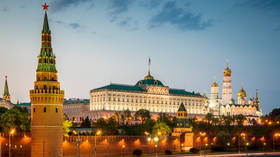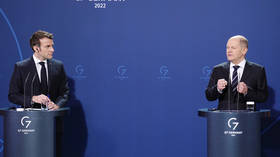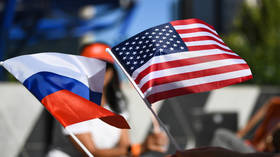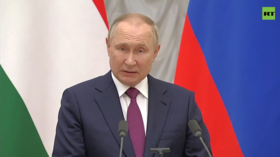As West refuses to back down, what is Russia's next move?

With tensions running high in Eastern Europe, Madrid’s El Pais newspaper has published leaked responses from the US and NATO to Russia’s proposals to de-escalate the situation on the continent.
Obviously, the document is unlikely to please Russia’s leadership. Moscow’s key demand was rejected – legally binding guarantees blocking the bloc’s potential further expansion, including into Ukraine. The remaining offers will do little to defuse the standoff or bring about compromises. Some are simply non-starters for Moscow. We are talking, for example, about the withdrawal of Russian troops or peacekeepers from Abkhazia, South Ossetia, Moldova, and Crimea.
Other proposals are unrealizable. Among them is the idea of returning to the implementation of the Treaty on Conventional Weapons in Europe. No NATO country has yet ratified its adapted version from 1999, so Russia has no reason to lift its moratorium on implementing it. Other proposals are possible in practice but unlikely to yield tangible results, such as resuming dialogue on security issues, including within the framework of the Russia-NATO Council. Dialogue is important in itself, but without the political will to achieve concrete results, it will be useless. There are also some proposals that can be considered groundwork for the future. Among them is the idea of inspecting missile defense facilities, or taking into account new weapons systems in negotiations on strategic stability. However, the critical mass of such proposals will not radically change the situation.
The stumbling block is the understanding of the concept of ‘indivisible security’. Russia insists that giving post-Soviet countries the freedom to choose alliances (read: in favor of NATO) strengthens their security to the detriment of Russia’s. That is, by adopting the principle of freedom of choice with respect to alliances, the principle of indivisible security in Europe is being undermined. Brussels and Washington respond with the familiar thesis that NATO is a defensive alliance and no threat to Russia, so Moscow needn’t worry. Russia holds a different opinion. And it is based on serious grounds.
Senior NATO officials and individual countries in the alliance have repeatedly declared that Russia is a potential adversary. The alliance’s infrastructure on the eastern flank is expanding, albeit gradually. NATO’s activities in Yugoslavia could by no means be considered ‘defensive’, nor could the actions of individual member countries taking part in a number of other conflicts. Therefore, Moscow will not take assurances of good intentions seriously.
However, the problem runs deeper than that. The principles that Russia and the West refer to were born at a different time and under different political circumstances. They were formed at the end of the Cold War – that is, when there was movement from confrontation towards peaceful coexistence and even partnership. In conditions of peace and partnership, implementing the principle of indivisible security was not difficult. Another thing is that the partnership was never fully consummated.
The West assumed that Russia was weak and doomed to further decline, so it had no alternative. It simply couldn’t afford confrontation and would swallow the victorious march of the United States and NATO into Eastern Europe. However, there was also a risk that NATO would be rendered irrelevant. The alliance really fell on hard times. Budgets shrank, military programs were cut back, and a significant portion of its troops left Europe. NATO exercises were an increasingly pathetic sight.
Geographic expansion did not lead to an increased number of security providers. And the nominal growth in US defense spending was dispersed in endless Middle East wars, not in Europe. Russia’s rapid return to the club of great powers, its dissatisfaction with the status quo, and its firm response to Georgia’s actions in 2008, and then the events in Ukraine in 2014, became a real gift for NATO bureaucrats and military leaders. “Here he is – the long-awaited old-new enemy! These are not some amorphous terrorists, but a full-fledged power, a dangerous enemy with its own philosophy and ambitions.”
Reigniting their previous rivalry, both Russia and NATO have tried to substantiate their claims by citing the general principles that they established during the period of detente and at the end of the Cold War. However, the problem is that they are simply unsuitable in an atmosphere of confrontation. It is impossible to reach compromises based on postulates from another reality. Sooner or later, the current tensions will finish them off and force the sides to think about new categories and principles. Under present circumstances, non-interference in internal affairs, the freedom to choose alliances, the indivisibility of security, etc. all represent a kind of utopia, including and especially in post-Soviet space. Interference is everywhere here, freedom is illusory, and security is quite divisible. The problem is aggravated by the weakness of many post-Soviet states, the archaization of institutions, inconsistent levels of modernization, and internal crises.
The answer to the question “What is to be done?” coming from the lips of the West is naturally very different from that being voiced by Russia. The West believes it is necessary to return to the natural course of things, which has been disrupted by an obstinate Moscow: “The bright future of post-Soviet space lies in Western structures or close to them. There are no alternatives to democracy and the market. And it’s better for the Kremlin to sit by quietly. Before you know it, Russia will be invited to the common table… that is, of course, if Ukraine, Georgia, the Baltic States, and others allow it.”
“No, guys, that’s not how it works,” they say in Moscow. “Democracy and the market cannot be applied like a linear equation. This can be clearly seen from the experiences in Afghanistan and other ‘democratized’ countries. But for Russia, this issue is secondary. Actually, we are not trying to propose any alternative models. Moscow cares little about the economic or even political structure of its neighbors. Russia is only concerned about one thing – its weaker neighbors being used by stronger players for military advantage.” This is the key problem. And Moscow is unlikely to back down from its decision.
The statements, views and opinions expressed in this column are solely those of the author and do not necessarily represent those of RT.















